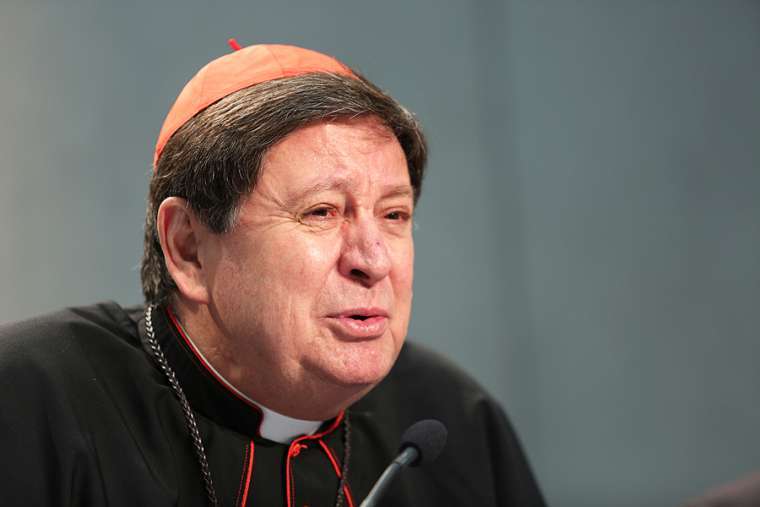Cardinal João Braz de Aviz, prefect of the Congregation for Institutes of Consecrated Life, at the Holy See press office, Dec. 14, 2015. / Credit: Daniel Ibáñez/CNA.
Consecrated life is beautiful and contains a call to witness to what is beautiful and true, Cardinal João Braz de Aviz wrote yesterday in a letter marking the 25th anniversary of St. John Paul II’s apostolic exhortation on consecrated life.
“If God is beautiful and the Lord Jesus ‘is the most beautiful among the sons of men,’ then being consecrated to Him is beautiful. The consecrated person is called to be a witness of beauty,” Braz de Aviz wrote yesterday.
“How beautiful is our being virgins to love with His heart, our being poor to say that He is the only treasure, our obedience to His will for salvation, and even among ourselves to seek only him,” he said.
“It is beautiful to have a heart that is free to welcome the pain of those who suffer, to show them the compassion of the Eternal One.”
The prefect of the Vatican Congregation for Institutes of Consecrated Life and Societies of Apostolic Life published the letter, looking back at St. John Paul II’s apostolic exhortation Vita consecrata.
St. John Paul II issued the exhortation in 1996 on the Solemnity of the Annunciation after the Synod on Consecrated Life and its role in the Church and the World.
Braz de Aviz said that the Vatican did not want the 25th anniversary of the apostolic exhortation’s publication “to go unnoticed.”
He said: “In that document, the bishops frequently reaffirmed that ‘consecrated life is at the very heart of the Church as a decisive element for her mission … a precious and necessary gift for the present and future of the People of God.’”
Consecrated life within the Catholic Church is a state of life “set apart” which involves the profession of vows of chastity, poverty, and obedience in imitation of Christ.
In Vita consecrata, John Paul II described consecrated life as an “icon of the transfigured Christ.”
“The consecrated life, deeply rooted in the example and teaching of Christ the Lord, is a gift of God the Father to his Church through the Holy Spirit. By the profession of the evangelical counsels, the characteristic features of Jesus — the chaste, poor and obedient one — are made constantly ‘visible’ in the midst of the world and the eyes of the faithful are directed towards the mystery of the Kingdom of God already at work in history, even as it awaits its full realization in heaven,” John Paul II wrote.
“In every age there have been men and women who, obedient to the Father’s call and to the prompting of the Spirit, have chosen this special way of following Christ, in order to devote themselves to him with an ‘undivided’ heart (cf. 1 Cor 7:34). Like the Apostles, they too have left everything behind in order to be with Christ and to put themselves, as he did, at the service of God and their brothers and sisters.”
“In this way, through the many charisms of spiritual and apostolic life bestowed on them by the Holy Spirit, they have helped to make the mystery and mission of the Church shine forth, and in doing so have contributed to the renewal of society.”
The text of Vita consecrata should “continue to be a point of reference in the coming years” and will nourish the “creative fidelity of consecrated persons,” Braz de Aviz said in his letter.
“In a world which risks sinking into disturbing brutality, the via pulchritudinis [way of beauty] seems to be the only way to arrive at the truth or to make it credible and attractive,” he said.
“Consecrated men and women must reawaken in themselves, but above all in the men and women of our time, an attraction for what is beautiful and true.”
Source: CNA

